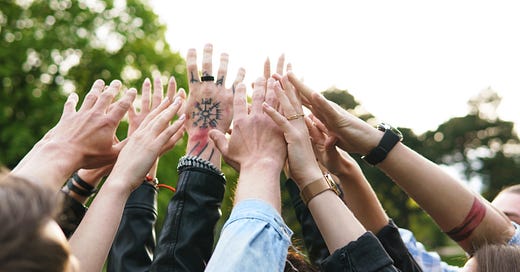Don’t feel like reading? Listen to the audio version of this blog—I dare you to click. It’s pure positive content.🔥
I came across Peter Sage’s TED Talk while researching how to set good, achievable goals. With the year coming to a close, Mark has been encouraging my colleagues and me to focus on growth—not just in business, but also on a personal level. It makes sense when you think about it. We’re helping patients recover from the grips of addiction, and the better we are—mentally, emotionally, and professionally—the better chance we give them to succeed.
That’s how I stumbled upon a quote that hit home: “Environment trumps will.” It’s from Peter Sage’s TED Talk back in 2020, and it stuck with me because it speaks to a truth that’s especially relevant in recovery. Willpower might get you started, but your environment keeps you sober. A toxic environment can pull even the strongest person back into old habits, while the right environment can uplift, inspire, and empower long-term change.
Why Environment—and Friends—Matter in Recovery
Recovery isn’t just about stopping substance use; it’s about creating a life where sobriety becomes sustainable. The truth is, your environment and your friends are deeply connected. The people you spend time with naturally dictate the environments you find yourself in. If your friends are still engaging in substance use, it’s almost inevitable that you’ll end up in places where that behavior is the norm. As Peter Sage says, “If you’re hanging out with nine drug addicts, you’ll most likely be the tenth.”
This connection is something my mom always reminded me of growing up. She would say, “Show me who your friends are, and I’ll know who you are.” That wisdom rings especially true in recovery. Your friends shape your habits and behaviors, sometimes more than you realize. If they’re leading you into environments tied to old habits, your brain will naturally revert to what feels familiar. It’s not about being weak—it’s about how powerful those patterns can be when they’re reinforced by both the people you’re with and the places you go.
But here’s the flip side: the right friends can lead you to environments that support your recovery. When you spend time with people who value sobriety, you’ll naturally end up in spaces that align with the life you’re trying to build. Instead of bars or parties, you might find yourself at a recovery meeting, on a hike, or simply enjoying a meaningful conversation. Friends who encourage you to stay on track don’t just support your goals—they help create the environment where success feels natural.
This is why it’s so important to take an honest look at who you surround yourself with. Friends aren’t just people—they’re a part of your environment. Choosing those who lift you up instead of pulling you back can make all the difference.
Practical Steps to Shape Your Recovery Environment
Creating a recovery-focused environment begins with awareness. It starts by auditing your life to identify the people, places, and routines that may trigger old behaviors. This kind of reflection can feel difficult, but it’s an essential first step. Some relationships, for example, may no longer align with your goals for sobriety, and recognizing this allows you to create the space needed to heal.
Building a supportive community is another crucial step. Programs like AA, NA, or local recovery groups offer connection, understanding, and accountability. They remind you that recovery is a shared journey and that support is always available. Even beyond formal recovery programs, seeking out people who uplift and encourage you to transform how you view your path forward.
Designing new routines also plays a key role in reshaping your environment. Replacing old habits with healthier ones—such as exercising to reduce stress, picking up a hobby that brings you joy, or starting therapy or journaling to process emotions—creates new, positive pathways for your mind to follow. These small but consistent changes reinforce progress and provide stability during moments of uncertainty.
It’s equally important to limit negative influences. This might mean distancing yourself from toxic people, avoiding places tied to substance use, or limiting exposure to negativity in the media. What you allow into your mind matters, and removing harmful influences creates space for growth, clarity, and healing.
A Message of Hope
Your environment is powerful, but you have the power to choose it. Recovery isn’t just about fighting the urge to go back to old habits; it’s about building a life where those habits no longer fit. The beauty of this process is that it doesn’t rely solely on willpower—it’s about creating an environment where success becomes inevitable.
Recovery is about more than just resisting what you used to do. It’s about surrounding yourself with people and places that align with the person you’re becoming. A supportive environment doesn’t just make sobriety possible; it makes it sustainable.
Conclusion: Take Control of Your Environment
If you’re in recovery, remember that success isn’t about willpower alone. It’s about shaping your surroundings to support the life you want to build. The right environment reinforces your strength, aligns with your goals, and makes lasting change feel natural.
Take a moment and reflect: What’s one change you can make to your environment today that will strengthen your recovery? Whether it’s removing a negative influence, joining a recovery group, or building a healthier routine, that change could make all the difference.
Your environment—and your friends—matter. Choose the ones that help you thrive.
Trivia Question:
In Peter Sage’s TED Talk, he uses a clever analogy to describe the relationship between the conscious mind and the subconscious mind. What small, hardworking animal does he compare the conscious mind to?
🎥 Click here to watch the video – it’s short, inspiring, and worth it!
🚀Think you know the answer?
Email your answer to david@asanarecovery.com. The first correct response will win a $25 gift card of your choice: Uber, DoorDash, or Amazon.
Good luck! 🎉










That was an awesome Ted Talk. We need to be the ant!!!